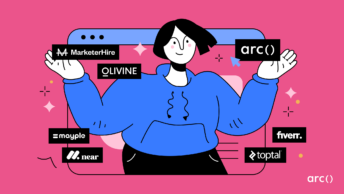When it comes to hiring remote developers, finding the right candidate is challenging. But with so many options for both hiring developers online and offline, it is easier than ever to find remote developers skilled in any language and framework.
The hard part? Finding someone qualified to be the exact match for your company.
There are three primary ways of finding qualified remote developers online: marketplaces, agencies, and traditional hiring. In this article, we’ll cover each of these methods and explain how they affect the hiring process. By the end, you’ll know which method will be the best fit for your business.
Short on time? Check out the summary tables at the end of the post 😉
Looking for top talent fast? See how Arc can help you:
⚡️ Find developers, designers, marketers, and more
⚡️ Freelance or full-time remote + fully vetted
⚡️ Save up to 80% with global hires
Hire top talent with Arc risk-free →
Overview of Marketplaces, Recruitment Agencies, and Traditional In-House Hiring
Online Marketplaces
The term “online marketplaces” usually refers to freelance platforms. Here, we can divide it still further, as there are two types of freelance hiring platforms: general and niche.
General freelance platforms include sites like Upwork, Guru, Freelancer, Fiverr, and others. On these marketplaces, you can find any kind of worker, including remote developers.
On the other hand, there are niche platforms like our very own, Arc. Niche platforms focus on specific professional skill sets. On these sites, candidates for remote work must pass a vetting process before employers can hire them. Here at Arc, we specialize in mid-level to senior software developers.
Recruitment Agencies
Recruitment agencies are a great option when looking for local talent (that can also work remotely). Agencies take care of vetting, matching, and also interviewing. Of course, this comes at a high price, which we’ll cover in more detail below.
Traditional Hiring
With traditional hiring, your own company (e.g., Engineering Team Lead, HR Department) administers and carries out the entire hiring process in-house. With the internet, there are many options for traditional hiring when it comes to finding great software engineers.
Read More: 40+ Best Upwork Alternatives & Freelance Websites for Your Next Project
Recruitment Factors When Hiring Developers Online
Each method has advantages and disadvantages: some will outperform in crucial areas while doing worse in others. What’s best for your company depends on your own unique situation.
These are the factors you should consider to ensure that you pick the best method for your specific needs:
- Total Hiring Process Length
- Vetting & Matching
- Trial Period
- Developer Quality Guarantee
- Cost of Time Spent on Interviewing & Screening
- Additional Employee Costs Beyond Payroll
Let’s unpack these further below!
Total Hiring Process Length

The hiring process to find a qualified remote developer requires a significant investment in time. It is essential to know, and budget for, the time commitment for sourcing talent. Moreover, you should consider how to save time.
Hiring a qualified remote developer via a recruitment agency or traditional hiring method takes anywhere between 58 and 62 days on average. On the other hand, a qualified remote developer can be hired via general freelance platforms in a matter of days or even hours.
This may take less time than traditional methods, but it could be very difficult to find qualified talent from the available general freelancer pool. Your company will still have to go through the hiring process to find a suitable candidate, including conducting interviews and providing the candidate with a short task or coding test.
We’re able to cut the time down to less than 72 hours at Arc for contractors, and an average of 14 days for permanent full-time roles. This is because our remote developers have already gone through a significant portion of the hiring process, including screening and vetting. Our matching process is powered by AI as well as customized, human-analyzed fit.
Read More: Freelance Developer Hiring Guide 2022: Salaries, Rates, Skills & More
Vetting & Matching in Online Hiring Method for Developers
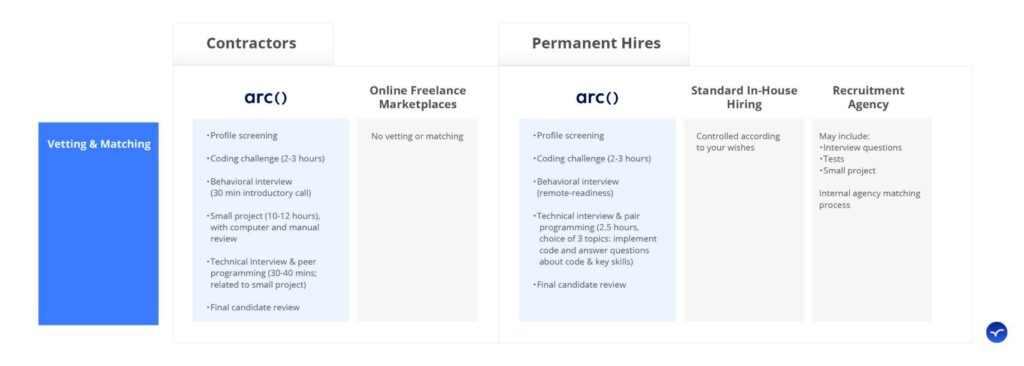
Vetting and matching are essential to check that a candidate is the right fit for your company.
General freelance marketplaces like Upwork and Freelancer have no vetting and matching process. You need to rely on what freelancers write on their profiles and previous reviews, taking a candidate’s word as to their qualifications.
To mitigate this, candidates will generally go through your company’s vetting and matching process as though they were a traditional hire. This can be expensive in terms of financial resources and time.
Recruitment agencies often have a vetting and matching process of their own. However, this can come at a high price, which may or may not be lower than the traditional hiring process. Moreover, you will have less control over how the agency does the vetting. This can translate to more uncertainty in regards to the quality of the candidate when decision time comes around.
Some niche freelance platforms will have a vetting and matching process of their own. Sometimes they can be great. Other times, they will be too simple and won’t provide adequate screening.
At Arc, candidates are extensively vetted against Silicon Valley-caliber assessments.
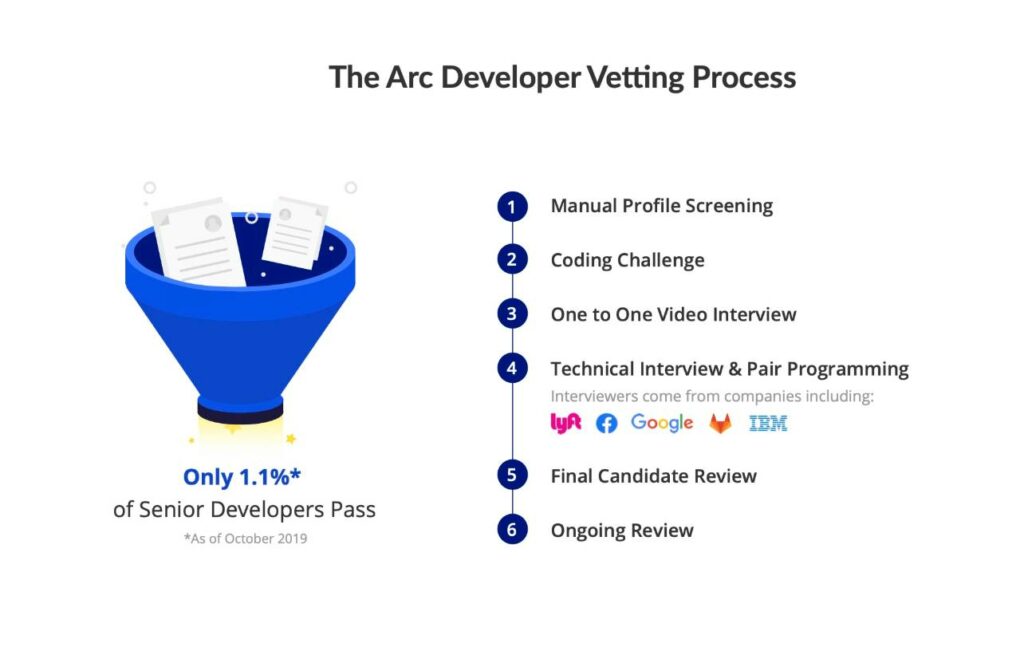
You can also try Arc, your shortcut to the world’s best remote talent:
⚡️ Access 450,000 top developers, designers, and marketers
⚡️ Vetted and ready to interview
⚡️ Freelance or full-time
Try Arc and hire top talent now →
Next up is the matching process. During this stage, a hiring consultant from our team helps create a shortlist of candidates.
Trial Period

By having a trial period, you can make sure that you made the right hiring choice. Offering a risk-free trial period is quickly becoming a staple of some niche freelance platforms (though most general platforms still don’t offer this possibility).
With traditional hiring methods, you may be able to negotiate a 7-90 day free trial period along with conditions. This is becoming more common, with many companies implementing a “temp-to-hire” or “temp-to-permanent” hiring process.
The risk? Driving away the best talent, especially if a competitor has no (or offers a paid) trial period. Additionally, a potential employee might also view an overly-long free trial period as unfair.
Recruitment agencies generally don’t give you a free trial period. They would often prefer that you commit to employing a remote developer. This being the case, the company can suffer negative consequences if the developer turns out to be an unsuitable fit.
General freelance platforms do not offer trial periods. As such, you will have to spend time negotiating a trial period with each individual developer.
Arc offers a risk-free trial period for contract developers you hire with us.
For permanent hires, Arc offers a risk-free trial period of three months. During this time, if you are unsatisfied, Arc will match you with another developer free of charge. Arc also offers contract-to-hire options.
Read More: 10+ Things to Consider BEFORE Hiring a Freelance Software Developer
Developer Quality Guarantee When Hiring Online

When it comes to finding the right talent, there will always be an element of risk. Nonetheless, there are ways to mitigate risk regardless of the hiring method.
General freelance platforms can be the riskiest option of all due to their lack of vetting and matching. Platforms like Upwork and Freelancer force remote developers to compete for jobs at lower and lower wages. Consequently, this drives away experienced, high-quality remote developers and opens your company to what can be a mixed bag of results.
Traditional hiring may be the best option. Of course, this is assuming your business has a proven track record of finding qualified developers — not to mention the necessary resources.
If quality is what you’re after, your company will have to go through a considerable amount of work. They’ll be posting job offers, putting up paid ads, and searching through the many online communities previously mentioned. They can be great places if your business is willing to put in the time and effort.
Recruitment agencies will often offer better quality. They sift through candidates and only put the best-qualified candidates on the shortlist for a remote developer position. Additionally, recruitment agencies often have access to national job boards.
Getting a job board on your own can be expensive and time-consuming. But the most significant advantage of recruiting agencies is that they have an effective interviewing and screening process which you might not be able to replicate in your own company.
Traditional hiring and recruitment agencies are excellent options that allow you to screen for higher-quality candidates according to your specific requirements. But a good hiring outcome still isn’t always certain with recruitment agencies, since you are limited to finding your developers from within a pool of local candidates.
In this scenario, location can be a critical factor. If your company is based out of a tech hub like Silicon Valley, Seattle, or even Austin, you will have an abundance of high-quality talent available locally. On the flip side, your competitors will be fighting for the same talent, making it expensive to acquire and retain.
Arc can guarantee that you will get access only to the very best developers. Not only do we have highly qualified developers in our community, but we also have developers who have worked in major tech companies like Google and Facebook.
Read More: Andela vs Toptal vs Turing vs Arc: Which is the Best Andela Alternative?
Cost of Time Spent Interviewing & Screening

When going through the hiring process, you have to take into consideration the cost in terms of time. Having your staff prepare the hiring process, remote-readiness interview questions, and everything else will be a considerable investment.
Traditional hiring will require an investment in time and money for recruitment. It will cost $1,018 – 1,438 at the lower end, not to mention it can take hundreds of hours. This translates to weeks or months going from posting on job boards, to pre-screening applicants, to the preparations for interviews, and finally wrapping up the process.
These costs assume that you have found a quality remote engineering candidate; if you end up with a less-than-ideal hire, it could cost your company between $25,000 and $50,000.
Recruitment agencies reduce the time and money spent on resumes and interviews thanks to outsourcing the hiring process. However, a company using a recruiting agency still has to complete the final steps, including preparing interviews for the shortlist of candidates the agency provides.
General freelance platforms involve approximately the same time investment that traditional hiring methods require.
Conversely, Arc will take on all these interviewing and screening tasks for you. The result? Your company will need only one short interview with each candidate (on average, with Arc there are two interviews in total before a hiring decision is made). This drastically cuts down your interviewing and screening time costs.
You can also try Arc, your shortcut to the world’s best remote talent:
⚡️ Access 450,000 top developers, designers, and marketers
⚡️ Vetted and ready to interview
⚡️ Freelance or full-time
Try Arc and hire top talent now →
Additional Employee Costs Beyond Payroll

When it comes to an in-house employee, benefits and indirect costs can add up to an additional 76% on top of a developer’s salary. This can also be true if you hire with the traditional method or via recruitment agencies.
Benefits packages include insurance, paid leave, retirement savings, and more. Other indirect costs include general and administrative expenses.
Remote developers hired from freelance platforms primarily run their own businesses. That means that they don’t require all those benefits, nor will there be indirect costs. You pay them their salary, and that’s it (unless you choose to negotiate something extra).
Arc, like all freelance platforms, has no additional or indirect costs for non-permanent/contract hires. Indeed, the article from earlier reveals that remote developers who work as freelancers tend to save companies up to 50%. So by choosing a niche freelance platform, you’re likely to minimize any additional costs.
Of course, if you choose to hire a permanent developer for your team through Arc, benefits packages should be considered as part of a wider employment package. These benefits will depend on the specifics of your situation.
One solution we recommend is Deel, a payroll and compliance platform built specifically for a worldwide workforce. With Deel, you can onboard remote employees and contractors in just minutes, as well as manage payments to more than 150 countries.
(For full disclosure, Deel is one of our partners. Learn more about our partnership and get a special signup offer exclusive to Arc clients and readers here!)
Read More: How to Implement a Welcoming Software Developer Onboarding Process
Hiring Developers Online — Wrap Up
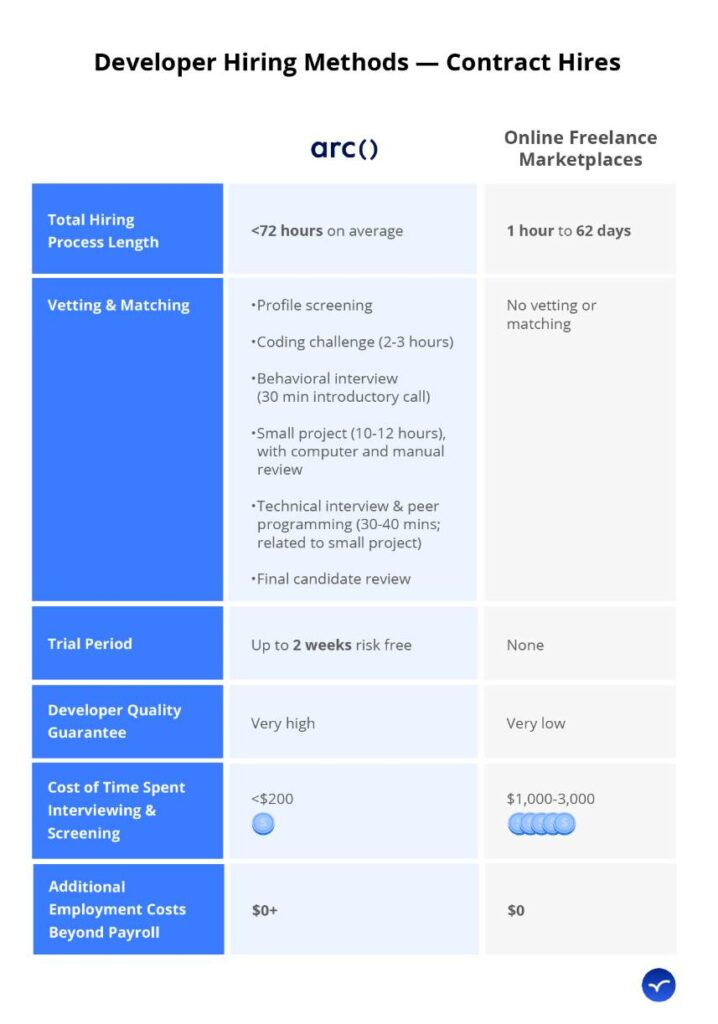
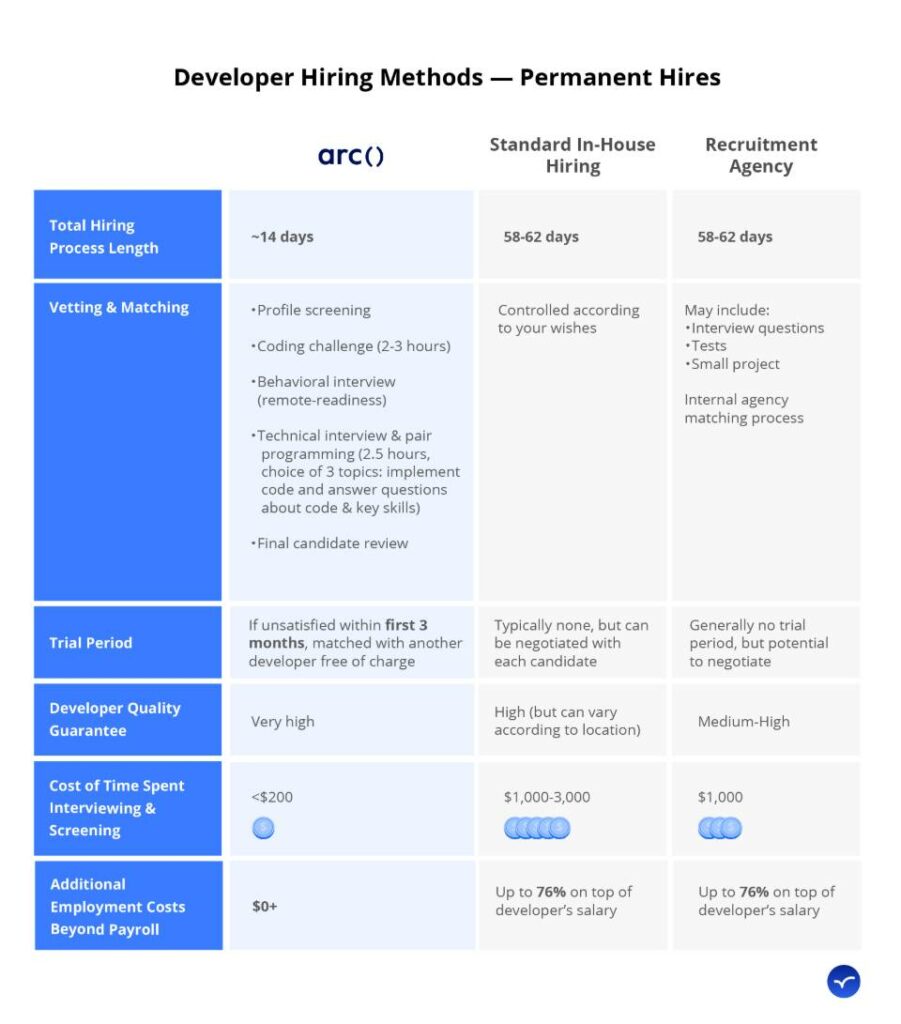
The good news for companies is this: when it comes to hiring developers, you have more options than ever. But with more options, it becomes critical to know which way is best for your business.
Marketplaces, recruitment agencies, and traditional hiring methods each have their risks and benefits. You should consider standard in-house hiring if you are absolutely confident that your company has the ideal process in place.
If that is not the case, certainly consider a recruitment agency or a niche freelance platform. Remember, Arc minimizes risks and expenses more than traditional hiring, recruitment agencies, or most other freelance platforms.
If you have any questions or comments, we’d love to hear from you! Leave a comment below.
We certainly hope this comparison of different methods for hiring developers online was helpful to you, and we’re looking forward to hearing about your experiences.
Looking for a developer and don’t want to waste time or jump through all the hoops?
You can also try Arc, your shortcut to the world’s best remote talent:
⚡️ Access 450,000 top developers, designers, and marketers
⚡️ Vetted and ready to interview
⚡️ Freelance or full-time






